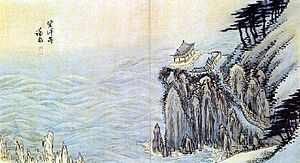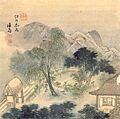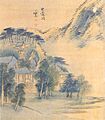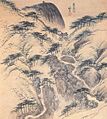Jeong Seon facts for kids
Quick facts for kids
Jeong Seon
|
|
|---|---|
| 정선 | |
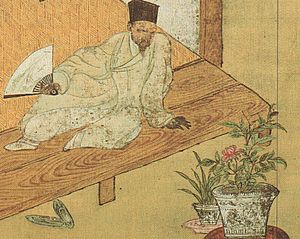
Detail from Taking a rest after reading books by Jeong Seon, believed to be a self-portrait of the painter.
|
|
| Born | 16 February 1676 (modern-day) Cheongun-dong, Jongno-gu, Seoul, Korea
|
| Died | 20 April 1759 (aged 83) (modern-day) Cheongun-dong, Jongno-gu, Seoul, Korea
|
| Known for | Painting, drawing |
|
Notable work
|
Inwangjesaekdo Geumgang jeondo |
| Movement | true-view painting |
| Jeong Seon | |
| Hangul |
정선
|
|---|---|
| Hanja |
鄭敾
|
| Revised Romanization | Jeong Seon |
| McCune–Reischauer | Chǒng Sǒn |
| Art name | |
| Hangul |
겸재 or 난곡
|
| Hanja |
謙齋 or 蘭谷
|
| Revised Romanization | Gyeomjae or Nan-gok |
| McCune–Reischauer | Kyǒmjae or Nan'gok |
| Courtesy name | |
| Hangul |
원백
|
| Hanja |
元伯
|
| Revised Romanization | Wonbaek |
| McCune–Reischauer | Wǒnbaek |
Jeong Seon (Korean: 정선) (1676–1759) was a very famous Korean artist. He is best known for his amazing landscape paintings. He also used the artist name Kyomjae.
Jeong Seon created many paintings using ink and traditional Korean watercolors. Some of his most famous works are Inwangjesaekdo (painted in 1751) and Geumgang jeondo (painted in 1734). He was especially known for his "true-view" landscape paintings. These paintings showed real places in Korea and captured the country's history and culture. His art was very realistic, not abstract.
Contents
Who Was Jeong Seon?
Jeong Seon was born on February 16, 1676, in a neighborhood called Cheongun-dong in Seoul, Korea. He was the oldest son in his family. Even as a young child, people noticed his great talent for art. He loved to paint every day and kept creating art even when he was old.
His family was not rich, so he couldn't become a "scholar-painter." These were wealthy people who painted just for fun. But Jeong Seon was lucky! Some powerful neighbors saw his talent. They helped him get a job at the Dohwaseo, which was the Joseon Bureau of Paintings. This meant he could paint for important people and clients.
Early Travels and Artworks
When Jeong Seon was 36 years old, in 1711, he went on a trip to Mount Geumgang. He traveled with a local governor named Pak Tae-yu. During this trip, Jeong Seon created an album of 13 paintings called Pungak Mountain, Sin-myo Year.
The very next year, he went back to Mount Geumgang. This time, he created another album with 30 paintings. It was called Realistic Representations of Sea and Mountains. Important people who supported Jeong Seon wrote poems to go along with his paintings. His artist name, Gyeomjae, means "humble study." This name showed his respect for these important people.
Official Roles and Recognition
Jeong Seon also had official jobs. In 1716, he became a special professor at the Office for Observance of Natural Phenomena. He was good at subjects like the I Ching (an ancient Chinese book) and astronomy. This job gave him an official position and helped him continue his art.
He also served as a local leader (called a district magistrate) in different areas, like Hayang (from 1721 to 1726), Chongha (around 1733), and Yangchon (from 1740 to 1745).
Later in his life, King Yeongjo honored Jeong Seon. The king gave him important official titles in 1754 and 1756. Jeong Seon passed away on April 20, 1759.
Why Is Jeong Seon Important?
Jeong Seon is one of the most famous Korean painters ever. He inspired many other Korean artists to paint in new ways. His work had a huge impact on Korean art. He was the most important painter during the late Joseon Dynasty (from 1700 to 1850).
Jeong Seon loved to paint the beautiful places in Korea. He painted the capital city of Hanyang (which is now Seoul), the Han River, the Sea of Japan, and the Diamond Mountain. He was the first artist to create "true-view" Korean landscapes. This means he painted real places exactly as they looked. He didn't use older Chinese painting styles. Instead, he created his own unique style that showed the beauty of Korea.
By the end of his life, Jeong Seon had developed his own realistic painting style. This was likely influenced by a movement called Sirhak, which focused on practical learning. His style was different from the popular Chinese art of the time, which often showed perfect, imaginary landscapes. Jeong Seon's grandson, Jeong Hwang, also painted in this true-view style.
What Was Jeong Seon's Painting Style Like?
Jeong Seon was one of the few Korean painters who moved away from traditional Chinese painting styles. People say he often left his art studio to paint the world around him, exactly as he saw it.
His paintings are sometimes grouped with the "Southern School" of painting. However, he created his own unique style. He showed natural scenes like mountains and rivers using bold brush strokes.
A key feature of his work is how he mixed dark and light areas. He did this by layering ink washes and lines. His paintings often show mountains with forests, and these forests are made lighter by mists and waterfalls. He used many small dots to create vegetation, a technique influenced by the Chinese painter Mi Fei. Jeong Seon's special style influenced many Korean artists after him. It became a well-known symbol of Korean national pride.
Images for kids
See also
 In Spanish: Jeong Seon para niños
In Spanish: Jeong Seon para niños
 | Selma Burke |
 | Pauline Powell Burns |
 | Frederick J. Brown |
 | Robert Blackburn |


